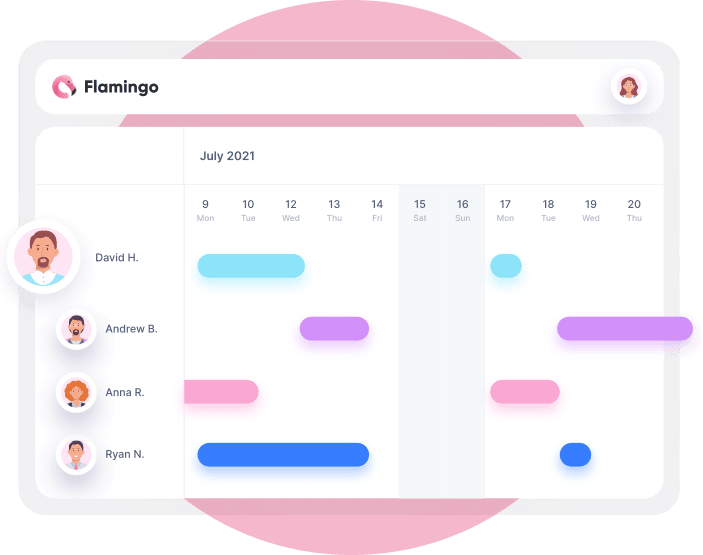
Flamingo is a leave management solution built for modern teams.
No more cluttered spreadsheets and manual data entry. Manage your entire team's leave, directly from Slack, and speed up your leave management workflow.
Learn moreIn this page, we’ll break down all you need to know about leave laws in Japan.
Read on to learn about employees’ rights in regards to paid time off/annual leave, sick leave, parental leave, national/public holidays, and more.
This page is intended for reference purposes only and does not constitute legal advice. Please see official government sources or consult a legal professional for actual legal advice.
Both full-time and part-time workers in Japan are entitled to annual leave, assuming they have six months service time with their current employer, and they have been present for 80% of their scheduled working hours.
From six months onwards, full-time employees get 10 days of annual leave, rising with more service time accrued. Part-time employees get a smaller amount, which also rises by service time.
Full-time employees in Japan get increasingly more annual leave correlating with their service time with their employer. The following table shows how much annual leave you get:
| Years of Service | Annual Leave Entitlement |
|---|---|
| 0.5 years | 10 days |
| 1.5 years | 11 days |
| 2.5 years | 12 days |
| 3.5 years | 14 days |
| 4.5 years | 16 days |
| 5.5 years | 18 days |
| 6.5+ years | 20 days |
Annual leave for part-time employees varies based on both service time and number of days worked per week. The leave entitlement starts from 0.5 years (six months) of service time, and increases as service time increases (not necessarily every year).
See the full spread of annual leave entitlement per number of working days/service time in the table below:
| Number of Working Days | Years of Service | Annual Leave Entitlement |
|---|---|---|
| 4 | 0.5 | 7 |
| 4 | 1.5 | 8 |
| 4 | 2.5 | 9 |
| 4 | 3.5 | 10 |
| 4 | 4.5 | 12 |
| 4 | 5.5 | 13 |
| 4 | 6.5+ | 15 |
| 3 | 0.5 | 5 |
| 3 | 1.5 | 6 |
| 3 | 3.5 | 8 |
| 3 | 4.5 | 9 |
| 3 | 5.5 | 10 |
| 3 | 6.5+ | 11 |
| 2 | 0.5 | 3 |
| 2 | 1.5 | 4 |
| 2 | 3.5 | 5 |
| 2 | 4.5 | 6 |
| 2 | 6.5 | 7 |
| 1 | 0.5 | 1 |
| 1 | 1.5 | 2 |
| 1 | 4.5+ | 3 |
Annual leave cannot be cashed out, except when an employee leaves their job (in which case, any unused annual leave must be paid out).
Annual leave can be carried forward for up to two years, though employers should ensure that employees take at least five days each year.
Learn more about Use It or Lose It policies here.
Sick leave is not entitled to workers by law in Japan. Employees typically use their annual leave to cover if they are ill and unable to work.
Employees are entitled to paid time off for work-related illness or injury, however, paid at 60% of the employee’s regular pay, plus medical costs.
There are 16 public holidays in Japan:
| Date | Holiday |
|---|---|
| January 1 | New Year’s Day |
| Second Monday in January | Coming of Age Day |
| February 11 | National Foundation Day |
| February 23 | Emperor’s Birthday |
| March 21 | Vernal Equinox |
| April 29 | Showa Day |
| May 3 | Constitution Memorial Day |
| May 4 | Greenery Day |
| May 5 | Children’s Day |
| Third Monday in July | Marine Day |
| August 11 | Mountain Day |
| Third Monday of September | Respect for the Aged Day |
| Varies (usually September 22, 23 or 24) | Autumnal Equinox |
| Second Monday of October | Health and Sports Day |
| November 3 | Culture Day |
| November 23 | Labor Thanksgiving Day |
Employees are entitled to a day off for public holidays, but employers are not legally obliged to pay their employees for public holidays. Many employers choose to do so regardless.
Employees are entitled to 14 weeks of maternity leave, including 6 weeks before birth and 8 weeks after birth.
After this time, mothers can take up to 52 weeks of childcare leave, up until their child turns 2.
Employers do not have to pay for maternity leave (though some may choose to do so) or childcare leave. Employees may be eligible for maternity benefits from Japanese social security. If granted, this provides 67% of the employee’s regular wages for the first 6 months, and 50% for the remainder.
Workers are entitled to 4 weeks of paternity leave, taken within 8 weeks of the child’s birth. This is paid by social security, at 67% of their regular salary.
Fathers are also entitled to up to 52 weeks of childcare leave.
Full-time employees are entitled to bereavement leave, of 5 days for a parent, child, or spouse, 3 days for a sibling, grandparent, or grandchild and 2 days for third degree relatives, such as a cousin, an uncle or an aunt.
Part-time employees are not entitled to bereavement leave by law.
What is Bereavement Leave? Click here to learn more.
Employees in Japan get the following additional leave types:

No more cluttered spreadsheets and manual data entry. Manage your entire team's leave, directly from Slack, and speed up your leave management workflow.
Learn more